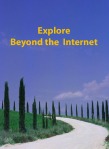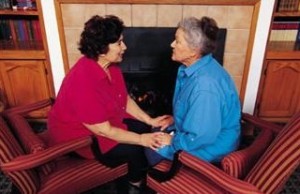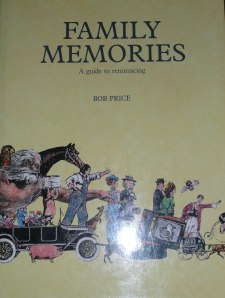
This week we’re up to Week 51 in my Beyond the Internet series in which I explore the sources of information beyond our computer screens. This week’s topic is Oral History.
Oral History can be an invaluable asset in our suite of offline research resources. Again and again we read others say that they wish they’d listened to their parents/grandparents/great-grandparents. I too wonder how I could know so little about my grandparents when they lived next door for up to 21 years of my life. However I think we also need to “forgive” ourselves: it’s far more common than not, for us to be self-preoccupied in our teenaged years, caught up with study, work and later our own families.
ORAL FAMILY HISTORY
 It’s only as time goes along that we start reflecting on missed opportunities, almost always too late. It also assumes that each and all of our immediate ancestors would have willingly bared their souls to us, yet we also know we reserve secrets and private moments in our own hearts. So respect and acceptance are required on this journey into oral history. It was only as I started to write my Kunkel family history that I was able to tease some information from my father before his death, contrary to his decades as a human information-clam.
It’s only as time goes along that we start reflecting on missed opportunities, almost always too late. It also assumes that each and all of our immediate ancestors would have willingly bared their souls to us, yet we also know we reserve secrets and private moments in our own hearts. So respect and acceptance are required on this journey into oral history. It was only as I started to write my Kunkel family history that I was able to tease some information from my father before his death, contrary to his decades as a human information-clam.
If we’re lucky some of our parents may be alive and we can start to ask them questions with interest and respect. Even if our parents are not alive there are other opportunities to capture some of their stories: what about close family friends who sometimes know more than we assume, or perhaps there’s an aunt or great aunt to tell the stories?
As you interview your family’s friends and relatives, there are many guidelines to follow so that you tease out answers without prejudicing what you’re told. You also need to weigh up past slights, family feuds etc to get a feel for whether you’re being told the “truth” which of course varies with almost every individual.
If you’re planning to do a series of oral history interviews you might be able to find out if your local library, archive or family history centre offers seminars of how best to go about them.
 In Australia, a good starting point is the Oral History Association of Australia (OHAA). They also have useful publications for sale. Your local archive may even have recording equipment that you can borrow: the OHAA would probably be able to advise you. I know that our reference library here in Darwin offered a training session a couple of years ago which was excellent, and there is now a wonderful resource on the NT Library webpage of Territory Stories.
In Australia, a good starting point is the Oral History Association of Australia (OHAA). They also have useful publications for sale. Your local archive may even have recording equipment that you can borrow: the OHAA would probably be able to advise you. I know that our reference library here in Darwin offered a training session a couple of years ago which was excellent, and there is now a wonderful resource on the NT Library webpage of Territory Stories.
A book I’ve found really helpful is Family Memories, A Guide to Reminiscing by Bob Price, available through the State Library of NSW Shop. It provides a helpful framework in which to consider the questions you want to ask your family. Quick readers can pick up a copy on eBay at present for a very good price (assuming it’s still available when this post goes up). Or you can get it on inter-library loan through the National Library of Australia.
ORAL LOCAL HISTORY
 So far it’s been implicit that we’ve been focusing on our family’s specific history, but if that’s not possible, there is a way around this apparent “brick wall”. Don’t forget there are other families who’ve lived in the area for many years and experienced many of the same crop failures, weather problems, wars, socials and weddings. You may find that you can learn a great deal about your family’s life indirectly in this way to add richness and texture to your story.
So far it’s been implicit that we’ve been focusing on our family’s specific history, but if that’s not possible, there is a way around this apparent “brick wall”. Don’t forget there are other families who’ve lived in the area for many years and experienced many of the same crop failures, weather problems, wars, socials and weddings. You may find that you can learn a great deal about your family’s life indirectly in this way to add richness and texture to your story.
One of the most valuable contacts I made was with the man who was the Murphy’s Creek (Qld) local history experts. Not only did he share a great deal of information with me but also provided me with copies of a recording of my grandfather’s younger cousin, Ann. I had met her a couple of years before her death and we had several discussions about the Kunkel family and as documentary facts proved her stories, it was apparent she was a “reliable witness”. I’ve mentioned this experience previously, and its importance to my own research here.
.However, what was especially interesting was the difference in content between Cameron’s recording and mine. In the local history version the stories were of playing tennis socially and competitively, social outings and people she knew including some relating to the Dorfprozelten descendants though it’s obvious she had no idea of this prior link. My tape of our conversations is about family connections and stories. Both are valuable and offer quite different dimensions to family and life in rural Queensland in the early years of the 1900s.
 ORAL PERSONAL HISTORY
ORAL PERSONAL HISTORY
I think it’s important that we don’t leave our own life stories as a blank page for our families. We know how much we’d love to have heard or seen our ancestors or to have something they’d written. It’s up to us to ensure that we leave a suitable legacy for our own descendants.
SUMMARY
Have you had any successes in recording and documenting your family’s history orally? Do you find it easy to do or challenging? I know I find it quite difficult and don’t think it’s one of my strengths.
Another great post Pauleen. I too believe that “Interest and respect” are crucial when we begin deliving into other people’s lives, whether they are alive or dead, and then putting this information out into the public sphere brings an even greater responsibility. You serve as a great example of how best to do this. Thankyou.
I’m only now starting to fully realise that I MUST begin recording my own “stories”. Was highlighted recently by my daughter-in-love when I was laughing over a memory… she was fascinated and exclaimed… “I didn’t know that Catherine!”
Cheerio for now.
LikeLike
How wonderful that your daughter-in-love is so interested in your stories! Definitely recording our own stories in some way is so important -a valuable heirloom to bequeath. Thank you for your kind compliment regarding respect…honest reporting of the facts is crucial but so is allowing our ancestors to have made mistakes, just as we do. Pauleen (BTW When did we mostly stop using cheerio?)
LikeLike
Meant to suggest having a look at the Sharing Memories prompts on Olive Tree Genealogy as a thought stimulus for writing our own stories. http://olivetreegenealogy.blogspot.com.au/p/sharing-memories.html
LikeLike
I had quite a bit of success documenting through oral history. My only regret is that I didn’t start sooner. I wouldn’t expect my grandparents or great great aunts to have spilled their inner most secrets but I realized this year that I have no idea how any of them celebrated Christmas when they were growing up. Did they have a tree? A special meal? gifts? I have no idea. Just a simple question on Christmas day over all those years of celebrating with them and I would know. That information wouldn’t break down any brick walls, but it would have helped fill in a picture of their lives.
LikeLike
That’s very true Kristin -it’s often the simplest things that help us to fill the gaps in our understanding of them. Perhaps generations to come will be luckier as I think we’re more aware of changes, perhaps? I was so fortunate to have some oral history about my 2x great grandparents from one of their grandchildren who knew them when she was very young -yet nothing from my own grandfather who was their eldest grandchild. He lived next door to me but his earlier life was a closed book….so many cases of I wish I’d asked.
LikeLike
My sister interviewed two of my great aunts (sisters, maiden spinsters who lived together) a number of years ago about their lives. It was helpful to have them both in the conversation, bouncing off each other, and elaborating on things the other said. As one of them is now dead this is a valuable source of information to me. It’s also just interesting for the social history aspect. Fascinating. My aunt is hoping to organise a day with my grandma and great aunt and great uncle (brother and sisters) for us to just sit around and talk about times past and long dead relatives. I must make sure we tape it.
LikeLike
That sounds like a big bonus to your family’s research, especially the social context, not just names. I think having more than one person together is a definite bonus as it helps to weight up the information and strikes the memories as you say. Good idea to do a similar one with your grandma & co… how about a video running in the background? Having the voices is great and the images would just add to that.
LikeLike
I just wrote a whole comment and it disappeared. Oh well.
My sister interviewed two of our great aunts a number of years ago. They are sisters, spinsters who lived together. It was very helpful to have the two of them there, bouncing off each other, elaborating something the other said. Fascinating, not just because of the information about the family, but also as social history.
My aunt is planning to have a day with my grandma, great aunt and great uncle (brother and sisters) where we can just sit around chatting about times past and long dead relatives. I must remember to tape it.
LikeLike